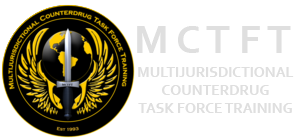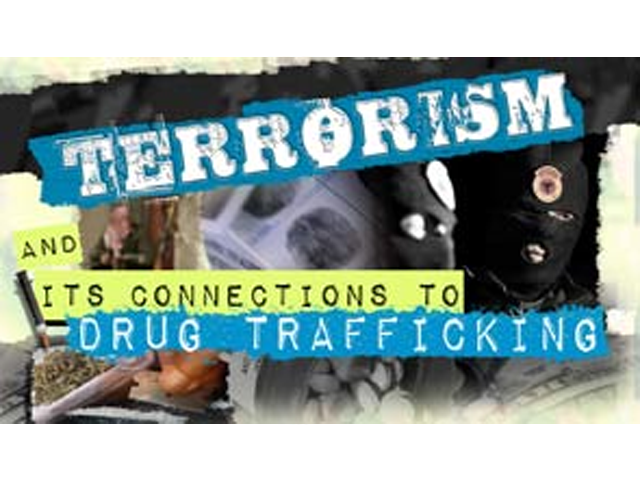This an hour-long broadcast focuses on officer safety as well as understanding terrorism and the importance of communication between law enforcement agencies. Domestically, State, local, and tribal law enforcement cooperation are supported by Federal initiatives such as the High Intensity Drug Trafficking Area (HIDTA) and the Organized Crime Drug Enforcement Task Force (OCDETF) programs. These efforts are supplemented by the work of the DEA’s Mobile Enforcement Team and U.S. Immigration and Customs Enforcement’s (ICE) Border Enforcement Security Task Force (BEST) programs, as well as by the work of Federal Agents operating out of DEA and ICE field offices across the Nation.
Learning objectives:
- Understand what terrorism is
- See how the drug trade facilitates the activities of terrorists and organized criminals worldwide
- Learn how officers remain safe using basic fundamental policing skills
- Know how vital communication is between all levels of law enforcement and it can be improved
- Learn what pre-incident indicators are how to identify them
- Learn about weapons-for-drugs exchanges and who this profitable business attracts
- Understand the aspect of this “entrepreneurial”style of crime and the intricate manner in which drugs and terrorism may be intermingled
- See how petty crimes can lead to large scale criminal activities
- Find out where narcotics are entering the United States from and what latest trends are used
- See how communities can help law enforcement
Originally Aired: June 25, 2009
Panelists
Gregory K. Allen
Chief of Police; El Paso Police Department
Gregory K. Allen was appointed Chief of Police of the El Paso Police Department on March 31, 2008. Chief Allen is a 30-year veteran of the El Paso Police Department and has worked as a Patrol Officer, Training Specialist at the Police Academy, Sergeant, Lieutenant, and Deputy Chief. Chief Allen has served in several high profile units of the Department including the Gang Task Force, SWAT, the Tactical Section, Auto Theft Task Force and Commander of the Dignitary Protection Team. During his tenure in the Tactical Section and SWAT, he served as a field officer as well as a supervisor. He was the first and only supervisor of a full time SWAT Unit. Chief Allen is a graduate of the University of Texas at El Paso, where he earned a Bachelor of Arts degree in Sociology in l975.
Chief Allen and the El Paso Police Department Homeland Security Section focuses its efforts in keeping El Paso free from any acts of domestic and /or international terrorism. The El Paso PD has developed departmental policies and procedures for Mitigation, Preparedness, Response and Recovery from Critical Incidents. El Paso PD coordinates information sharing between the various government entities dedicated to Homeland Security and the department and community. Continuous assessment of the city’s anti-terrorism identifies vulnerable potential targets and critical infrastructures. The El Paso PD as also developed and implemented plans and funding to secure critical police infrastructure as well as locate and develop liaisons with other first responders and private entities in the El Paso Metroplex. The El Paso PD develops coordination between the El Paso Police Department and State of Texas Emergency Management Agencies and FEMA.
Richard Holden
Ph.D. Director, State and Local Anti-Terrorism Training Program; Tallahassee Florida
Richard Holden (Ph.D., Same Houston State University) is Director of the USDoJ BJA State and Local Anti-Terrorism Training Program (SLATT) at the Institute of Intergovernmental Research (IIR) in Tallahassee, Florida. Rick is a former Professor and Chair of the Department of Criminal Justice at Central Missouri State University where he was also the Director of the National Police Institute and regional police academy housed within that unit. A former police officer in Irving, Texas, Bellingham and Colfax, Washington, Dr. Holden has written three books on policing and police management. In addition, he has served as a consultant to a number of police agencies on a variety of issues involving promotion procedures and civilian review.
Dr. Holden has been active in a number of professional associations such as the International Association of Chiefs of Police and the Academy of Criminal Justice Sciences where he chaired the Police Section, served as Trustee and Webmaster. He has studied terrorism and radical political movements for over 20 years. During that time he has taught courses and presented numerous papers and training programs on both international and domestic terrorism. Since 9/11 Dr. Holden has conducted training on homeland security/terrorism issues for SLATT, at the FBI Academy, and for USDoJ COPS Institutes in several states.
Robert W. Taylor, Ph.D.
Department of Criminal Justice; the University of North Texas
Dr. Robert W. Taylor is currently the Executive Director of the W.W. Caruth Jr., Police Institute at Dallas. For the past 25 years, Bob has studied police responses to crime and terrorism, focusing on issues in the Middle East. He has traveled extensively throughout the Middle East, meeting several heads of state in that region. He has acted as a consultant to numerous federal agencies on intelligence analysis and terrorism, hostage negotiations, Middle Eastern groups, and Palestinian-Israeli conflict.
Since September 11, 2001, Bob has been a consultant to the U.S. Department of Justice working with the Institute for Intergovernmental Research (IIR). He acts as a lead instructor in the State and Local Anti-Terrorism Training – SLATT program and is responsible for training all law enforcement and other related criminal justice professionals (specifically the FBI Joint Terrorism Task Forces — JTTF and the DEA High Intensity Drug-Trafficking Area Strike Forces – HIDTA) on Middle Eastern groups and issues. Bob has also worked extensively throughout the Middle East, especially in the country of Turkey. He is currently an instructor for the U.S. Department of State, Anti-Terrorism Assistance -ATA Program and teaches internationally in the Executive Seminar on Cyber Terrorism presented to executives of foreign governments.
In addition, Dr. Taylor has authored or co-authored over two hundred articles, books, and manuscripts. Most of his publications focus on international and domestic terrorism, police administration and management, police procedures, drug trafficking, and criminal justice policy. His articles appear in numerous journals including Defense Analysis (University of Oxford, England Press), the ANNALS (American Academy of Political and Social Sciences), Police Quarterly, Crime and Delinquency, and the Police Chief (International Association of Chiefs of Police). Dr. Taylor is a graduate of Michigan State University (Master of Science-1973) and Portland State University (Doctor of Philosophy-1981).

